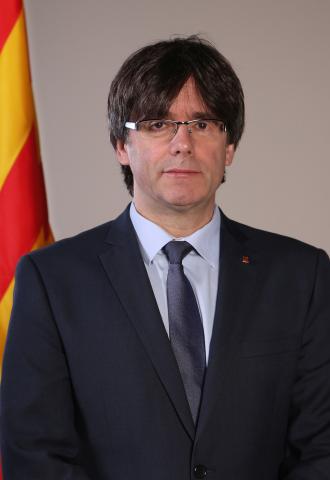Carles Puigdemont: This is not just about Catalonia. This is about democracy itself

By Carles Puigdemont
Catalonia is right now the only territory in the European Union that has been denied the supreme law its citizens voted for; the parliament that its citizens elected; the president that this parliament elected; and the government that this president appointed in the exercise of his powers. Acting in an arbitrary, undemocratic, and in my view, unlawful manner, the Spanish state decided to dissolve the Catalan parliament in the middle of the legislative term, to dismiss the president and the Catalan government, to intervene in our self-government and the institutions that the Catalans have been building in our nation for centuries. It committed a brutal judicial offensive to bring about the mass imprisonment and criminalisation of candidates promoting political ideas that, just two years ago, obtained historically high levels of public support.
Today, the leaders of this democratic project stand accused of rebellion and face the severest punishment possible under the Spanish penal code – the same as for cases of terrorism or murder: 30 years in prison. The vice-president and seven Catalan government ministers have been in prison since last Thursday, as well as two Catalan civic leaders, while orders for the rest of the Catalan government to be detained have been issued. This is a colossal outrage that will have serious consequences.
Let us remember one key fact: in the elections of 27 September 2015, Junts pel Sí (Together for Yes), the undisputed winner, stood on a manifesto where it explicitly pledged to declare independence and to convene constituent elections. The voters who supported us knew at all times what our purpose was. Yet two years after those elections we are accused of sedition, conspiracy and rebellion for delivering on an electoral programme that we never concealed.
It’s an odd conspiracy, one that receives the popular vote. The 2015 elections delivered a clear majority in favour of Catalan independence: 72 seats out of 135. Only 52 of the 135 seats went to candidates who explicitly rejected the idea of an independence referendum. Yet the legitimate Catalan government has now been outlawed, the Catalan parliament dissolved and a political agenda that has nothing to do with the will of the majority has been imposed.
This is why we will continue denouncing to the entire world the serious democratic shortcomings that are now evident in Spain.
Surely, what must prevail is the will of the majority of the citizens and the respect for fundamental rights included in international treaties signed by the kingdom of Spain, and also incorporated into its constitution. What we have instead are two levels of democracy in Spain: you can be a pro-independence party, but only if you do not rule. You will be charged with rebellion if you comply with your electoral commitment. And if you are against independence but you lack a parliamentary force to govern, the almighty state will come to your defence.
The Spanish judicial system has its own, particularly serious, shortcomings. There is a clear lack of independence and neutrality, with the links between the judiciary and the government visible for all to see. Even at the procedural level, the legal cases against Catalan leaders contain so many irregularities that it is difficult to believe that the accused can rely on any formal guarantees.
The state has demonstrated its determination to strip public officials of their rights, and Spanish justice has been placed at the service of the government’s political agenda. No crime committed in the name of the unity of the country will ever be prosecuted: not the violations of the secrecy of postal correspondence, nor the repeated restrictions on the right to freedom of expression, the blocking of websites without judicial authorisation, arrests made without judicial order, nor the certification of a police brigade outside the law to illegally pursue pro-independence political leaders and the Spanish left.
In demonstrations convened by the governing party of Spain, ultra-right radical groups (direct heirs of the Franco regime, such as the Spanish Falange) have marched, some brandishing fascist banners and making Nazi salutes, while songs demanding my imprisonment and execution have been widely sung. The climate of hostility is summed up by the scream, “Go for them!” from many Spanish citizens as they cheered the police patrols from around the state deployed to prevent the 1 October referendum, an effort by land, sea and air that resembled a military campaign to occupy rebel territory.
Does anyone think that the sacked Catalan government can expect a fair and independent hearing, uninfluenced by political and media pressure? I do not. We will continue to seek the independence of Catalonia, and defend a model of society in which no one is afraid of the power of the state.
I have a duty to demand justice for all of us. Real justice. To bring light to all the dark areas in which the state is allowed to commit unacceptable abuses. And to do this we need to allow in scrutiny from abroad. This attention must above all serve to demand a political rather than judicial solution to the problem.
The Spanish state must honour what was said so many times in the years of terrorism: end violence and we can talk about everything. We, the supporters of Catalan independence, have never opted for violence – on the contrary. But now we find it was all a lie when we were told that everything was up for discussion.
It may be uncomfortable for those who have given their uncritical and unconditional support to Mariano Rajoy’s government, but we will defend our rights to the end. Because we’re playing with much more than our personal futures: we’re playing with democracy itself.
• Carles Puigdemont became the 130th president of Catalonia in 2016
Source: The Guardian, UK
